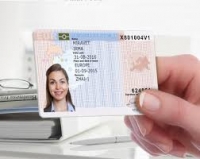
EU Member States are facing employment shortages in a number of key sectors: Europe could need up to 756,000 skilled ICT workers and around a million healthcare professionals by 2020. A revised EU Blue Card aims to attract the world's best and brightest.
The Lisbon European Council in March 2000 set the Community the objective of becoming the most competitive and dynamic knowledge-based economy in the world, capable of sustainable economic growth with more and better jobs, and greater social cohesion.
In October 2007, the European Commission adopted two proposals. The first was to establish a Framework Directive for the purpose of the admission of skilled and educated migrants to the EU, later known as the EU Blue Card directive. The second proposal is a directive to simplify migration procedures by funnelling applicants into a single application procedure, the single permit directive. In May 2009, the European Council adopted the EU Blue Card directive. In December 2011, the single permit directive was adopted.
Together, they establish the EU Blue Card Scheme: A demand-driven, residence and work permit.
"Labour migration into Europe boosts our competitiveness and therefore our economic growth.
It also helps tackle demographic problems resulting from our ageing population."
José Manuel Barroso
Objectives
The EU Blue Card program is designed to make Europe a more attractive destination for professionals from outside the European Union. All EU member states -except the United Kingdom, Denmark and Ireland- issue the EU Blue Card.
To an extent the Blue Card program is a merit-based system; interpreting a person with ‘merits’ as one who received adequate education or, through professional experience possesses sought-after skills. The blue card is not points-based; either you have the education or skills, or you do not.
The European initiative has a number of distinctive qualities that will help Europe become the world's most favourite migration destination:
- Working and salary conditions equal to nationals
- Free movement within the Schengen area
- Entitlement to a series of socio-economic rights (e.g. unemployment benefit)
- Favourable conditions for family reunification
- Permanent residence perspective
- Freedom of association
Conditions
Three key conditions are to be met in order to request the EU Blue Card.
- Non-EU citizenship
- Educated or professionally experienced
- Work contract or binding job offer
Your profile in the EU Blue Card Network has a double function: it can be consulted by employers so that they can offer you a job contract. Secondly, it enables you to submit your application.
Leave a comment
Make sure you enter all the required information, indicated by an asterisk (*). HTML code is not allowed.
Join
FREE
Here










